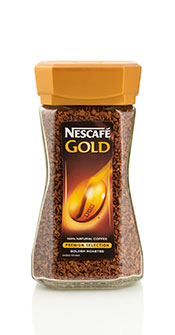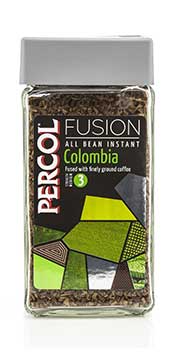
Coffee is one of the world’s most popular drinks.
It tastes delicious and, for most people, it is generally a healthy drink.
However, there are many different types of coffee, and some people claim that instant coffee isn’t as healthy as the freshly ground variety.
There are a lot of facts and myths behind this claim, so this article aims to set the record straight.
In this article, we will examine instant coffee’s nutrition profile and how it compares to regular coffee.
Most importantly, we’ll look at what the studies say.
What Is Instant Coffee?
Instant coffee is a powdered and water-soluble version of regular coffee.
To make the drink, all you need to do is add a spoonful of powder to your cup and add hot water.
Unlike some claims to the contrary, there are no additional ingredients, and the product is made from 100% coffee.
However, due to the processing involved, many people don’t class this variety of the drink as “real coffee.”
This belief is especially prevalent in Italy and the Mediterranean region, where instant coffee barely even exists.
How Is It Made?
First of all, instant coffee starts the same way regular coffee does; the coffee beans are roasted to increase their flavor.
Following this, manufacturers use a water-extraction technique to make a coffee extract from the soluble contents of the coffee beans.
After this stage, there are two ways that manufacturers produce instant coffee; freeze-drying and spray-drying (1).
- Freeze-drying: Despite being more expensive, this method is preferred since it is perceived to result in a higher quality cup of coffee. Freeze-drying involves quickly freezing the coffee extract and then breaking it into small granules. These small, frozen granules then enter a drying chamber.
- Spray-drying: this method is cheaper, quicker, and thus more economical than freeze-drying. It works by spraying the liquid coffee extract into a hot air stream, which flash-dries the coffee into tiny granules.
Types of Instant Coffee
There are a variety of different instant coffee products you can buy, and these include;
- Instant Coffee Granules: This product is just the pure coffee granules, and it usually comes in a glass jar or a plastic pouch. It will always be 100% coffee.
- Coffee Sticks and Sachets: You can buy these in boxes containing a set amount of single-serving sachets or sticks. These could be pure coffee, but they often contain sugar and various creamers too. They are also much more expensive gram for gram.
- Ready To Drink: Coffee that comes in a ready-to-drink can or a bottle. These drinks also often contain sweeteners or creamers, and they are available in various flavors. Since they cost from $1 to $3 per drink, they are the least economical choice.
Differences Between Instant Coffee and Ground Coffee

For me, instant coffee can’t compete with a nice cup of freshly brewed coffee.
However, there are more things to consider than taste.
Despite the fact that both varieties are made from 100% coffee beans, there are a few nutritional differences between the two.
1. Instant Coffee Contains Higher Amounts of Acrylamide
Acrylamide is a chemical that forms during a reaction between amino acids and sugar while heating certain foods. And yes, coffee beans contain sugars; in fact, coffee beans are approximately 50% carbohydrate by weight (2, 3).
Most commonly, acrylamide is found in starchy foods that have been cooked at high temperatures. For instance, potato chips and french fries tend to contain higher concentrations of the chemical (4).
In experimental rat studies, exposure to acrylamide throughout life increases the risk of cancer (5, 6).
However, despite many large-scale epidemiological studies on acrylamide and human health, the link with cancer has not been confirmed in humans (7, 8).
While all kinds of coffee contain acrylamide, they do so in different proportions, and instant coffee contains the most.
A recent study measured the acrylamide content of various coffees to see how they compared (9);
- Instant Coffee: 358 mcg/kg
- Roasted Brewed Coffee: 179 mcg/kg
As we can see, instant coffee contains double the amount of acrylamide compared to regular coffee.
This higher concentration is likely a result of high heat processing during its manufacture.
Further studies are necessary to determine the true risks of acrylamide for human health.
2. Caffeine Content
When it comes to our health, caffeine is a double-edged sword.
Firstly, it can have numerous benefits which may include;
- Sports and physical performance benefits (10).
- Improved alertness, mental focus and concentration (11).
- A potential protective effect against cognitive health conditions and dementia (12).
However, it isn’t all good news.
Caffeine seems to affect different people differently, and studies demonstrate that caffeine can sometimes aggravate gastrointestinal issues such as acid reflux (13).
Additionally, higher caffeine intake increases levels of anxiety and stress in some people (14).
Instant coffee contains less caffeine.
Depending on how caffeine personally affects you, instant coffee containing less caffeine could be either a positive or a negative.
For instance, a typical cup of freshly brewed coffee contains around 95-165 mg of caffeine.
However, an equivalent-sized cup of instant coffee only provides about 63 mg (15).
It is worth remembering that instant coffee was actually brewed coffee liquid before it was dried.
In other words, when you add water to the coffee granules, it is the second time that the coffee has been diluted.
3. Polyphenol Content
Coffee is one of the most polyphenol-rich substances in the world, and one of the primary compounds it contains is chlorogenic acid.
Chlorogenic acid is a phytonutrient that has a range of health benefits relating to blood pressure and blood glucose regulation (16, 17).
See this full guide to chlorogenic acid for more information.
Chlorogenic Acid Content by Type of Coffee
Notably, the chlorogenic acid content of coffee is dependent upon the degree of heat processing involved.
For example, green coffee beans and light coffee roasts contain much higher concentrations of chlorogenic acid than medium and dark roasts.
Since some instant coffee undergoes high-heat processing, the levels of chlorogenic acid are likely lower than in lightly roasted ground coffee in these products.
Despite a study from 2013 showing that instant coffee processing has no significant impact on chlorogenic acid content, a later study that tested various commercial coffees found some differences (18, 19).
In fact, this recent study analyzed the chlorogenic acid content of various coffee preparations bought in cafes across three different countries.
The table below shows the study’s data on the median chlorogenic acid content for espresso-based drinks and instant coffee (20);
| Type of Coffee | Chlorogenic Acid (mg per serving) |
| Italian Espresso | 46 |
| Spanish Espresso | 142 |
| Scottish Espresso | 59 |
| Scottish Cappucino | 103 |
| Instant Coffees | 64 |
As the data shows, instant coffee contains more chlorogenic acid than Italian espresso, but less than Spanish brewed coffee.
Since heat processing can reduce chlorogenic acid content, this makes sense. The difference is likely due to the Italian preference for drinking longer, dark roasts of coffee.
Spanish coffee emphasizes light, mild roasts, and this reflects in the coffee’s chlorogenic acid content.
Health Benefits of Instant Coffee

Instant and ground coffee have relatively similar nutrient profiles, and they contain the same polyphenolic compounds.
As a result, there should be no significant differences regarding the health benefits they offer.
Various studies have found that coffee may potentially provide a range of beneficial effects on our health.
Some of these are related to the positive effects of caffeine, and others are due to chlorogenic acid and other polyphenols.
While some of these benefits are observational, others have been proven through randomized trials.
To summarize, instant coffee may offer some of the following health benefits;
- Lower risk of cancer (observational).
- Boosts physical and mental performance.
- Lowers the risk of melanoma (animal studies).
- Improves blood-glucose regulation.
- Provides a range of health-protective polyphenols.
- May lower the risk of Alzheimer’s disease and dementia (observational).
- Coffee drinkers live longer lives (observational).
Instant Coffee: Pros and Cons
Now that we know instant coffee has most of the same benefits as the freshly ground variety, let us consider the general positives and negatives.
Pros
- Much cheaper than ground and store-bought coffee.
- It is the most convenient option and only requires a cup and hot water.
- We can take it with us to the office or when traveling.
- Contains less caffeine (a benefit for caffeine-sensitive people).
- There is a wide variety of choice, and some instant coffees contain a blend of green and roasted beans.
Cons
- Contains less caffeine (for those wanting an early morning/pre-workout boost).
- Can’t compete with the taste of a freshly brewed cup of ground coffee.
- Contains higher concentrations of acrylamide than regular coffee.
- Some types of instant coffee (ready to drink and coffee sachets) may contain various sweeteners and oil-based creamers.

Recipes
One of the interesting things about instant coffee is that it can work well in various recipes.
Since it is water soluble, the granules dissolve in hot food/drinks and the coffee flavor can create nice flavors in some dishes.
Here are a few recipe ideas (to serve 1) that taste great;
- Instant Coffee Mocha: Mix a teaspoon of coffee and a teaspoon of cocoa with a cup of milk, some vanilla extract, pinch of cinnamon, and a topping of heavy cream. Use a sweetener if desired.
- Mocha Mousse: Whip (or food process) 2 teaspoons of coffee, 2 teaspoons of cocoa, 1 tablespoon of butter, 1/2 cup of sour cream, and 2 oz of cream cheese. Add vanilla, cinnamon, and a sweetener if desired, and serve in a glass.
- Coffee Rubbed Steak: Keeping it simple works best with cuts of meat, but if you want to try something different, consider trying a coffee-rubbed steak recipe.
Final Thoughts
For a real coffee connoisseur, instant coffee is never going to match up to a properly brewed cup. The taste just cannot compare.
However, that isn’t what instant coffee is trying to be.
Instead, it offers a cheap and convenient option that is simple to make and easily transportable.
It is also a gentler option for those who don’t metabolize caffeine well.
The health benefits are fairly similar, and the risks posed by acrylamide to human health haven’t been firmly established.
With this in mind, instant coffee is a decent option for those who don’t care about drinking the best quality coffee.
For more on coffee, see this guide to the most popular coffee drinks and their nutritional properties:
12 Popular Coffee Drinks and Their Nutritional Profiles
Related Articles








